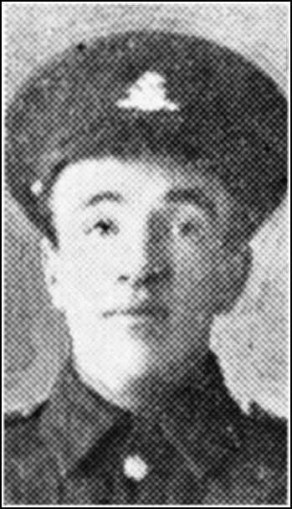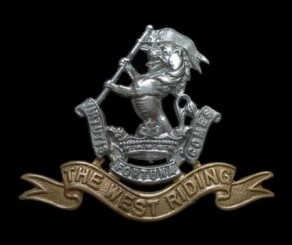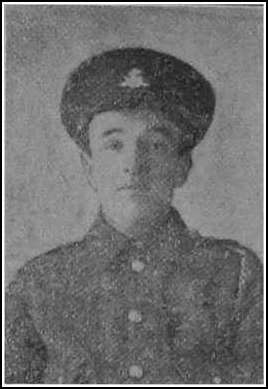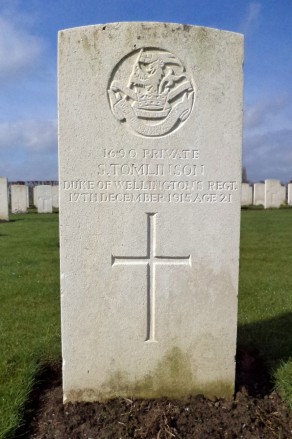
31 December 1915
INGLETON AND THE WAR – The Sixth Fatality
Amongst those who attested at Settle were the following from Ingleton Fells:–
Thomas Faraday, John Faraday, James Parker, John Mason, Robert Lambert, Bryan Chapman, William Middleton, and William Hilton. These names bring the Ingleton Roll of Honour to 231.
Pte. W. Bolton, 6th Duke of Wellington’s West Riding Regiment, was killed by shrapnel some time ago. He is the fifth Ingletonian to lay down his life for his country.
Pte. Stanley Thornber was shot through the chest some weeks ago, the bullet passing above the heart. The bullet has not been extracted, as an operation might prove dangerous.
Pte. Harold Howson, who has been in hospital suffering from trench foot, is at home, and Privates Joe Vickers and J. W. Robinson are at home on furlough from the Front.
News has just been received that Pte Cyril Tomlinson, 21 years of age, has been killed in the trenches by a sniper. He was the eldest son of Pte. Edward Tomlinson, Main Street; and went out to the Front with the 6th Duke of Wellington’s Regiment. Immediately on receipt of the sad intelligence, the Union Jack was hoisted half-mast at St. Mary’s Church. He is the sixth Ingletonian to give up his life for his King and country. As well as his father he has two brothers and several relatives serving with the forces. His brother-in-law, Pte. H. Routledge, has been gassed and is now in hospital at Lincoln.
Dr. Mackenzie has received a telegram from the War Office intimating that his son, Capt. Gordon Mackenzie, has been wounded in action, but the extent of his injuries is not yet known.
It is also reported that Pte. J. Nash and Pte. J. Waring have been wounded, and Pte. J. Clapham gassed, so that it would appear that the Ingletonians have been in the thick of it recently.
17 March 1916
INGLETON – A Patriotic Family
Mr.and Mrs. John Slinger (Albion House, Ingleton) are to be congratulated on the part their children are playing in the war. They have nine sons, 3 sons-in-law, three grandsons, two grandsons-in-law, and several nephews now or recently serving in His Majesty’s Forces. Their names are:–
Private Sinnet Slinger (6th Duke of Wellington’s West Riding Regiment), now time expired; Private Ernest Slinger (6th Duke of Wellington’s W.R.R.); Private Vincent Slinger (6th Duke of Wellington’s W.R.R.); Private John Slinger (Yorkshire Hussars); Lance-Corporal Herbert Moorey (Military Mounted Police); Pte. Cyril [Syril] Tomlinson (6th Duke of Wellington’s W.R.R.), who has made the supreme sacrifice, having been killed in Belgium; Private Charles Tomlinson (6th Duke of Wellington’s W.R.R.); Private Percy Tomlinson (6th Duke of Wellington’s W.R.R.); Private Edward Tomlinson (6th Duke of Wellington’s W.R.R.); Lance-Corporal Herbert Routledge (8th Leeds Rifles), gassed in Belgium; Private Albert Jowett (6th Duke of Wellington’s W.R.R.), invalided home from the Front; Private Thomas Richardson (King’s Own Yorkshire Light Infantry 2nd Battalion) now time expired, who has served at the Front since the outbreak of war without a scratch; Private George Richardson (Royal Garrison Artillery); Private Edward Richardson (Yorkshire Light Infantry); Private Walter Richardson (Yorkshire Light Infantry); Lance-Corporal Ernest Richardson (Yorkshire Light Infantry), wounded at Loos on September 26th with a bullet through the neck; and Private Herbert Hogg (West Yorkshire Regiment). Of the seventeen mentioned, fourteen have already seen active service, one (Private Edward Tomlinson) is a grandfather, and one of his sons has given his life for his country, and the other two are in training for the Front. Mr. Slinger who is nearing the three score years and ten, was himself a Volunteer in the old days. A keen sportsman, he is one of the best shots and one of the best anglers in the Ingleton district. In spite of his years, he is very active and thinks nothing of a day spent on the fells and moors with gun and dog.
15 December 1916
TOMLINSON – In loving remembrance of Pte. Cyril Tomlinson (Duke of Wellington’s West Riding Regiment), eldest son of Mr. and Mrs. Edward Tomlinson, Lemon Cottage, Ingleton, who was killed in action in Belgium, December 17th, 1915.
20 April 1917
INGLETON – War Items
Mr. and Mrs. Edward Tomlinson, Lemon Cottage, have received word from their son, Pte. Percy Tomlinson, that he has been wounded and is in a base hospital in France. Mr. Tomlinson’s eldest son, Cyril, was killed by a sniper about twelve months ago. – Pte. Fred Foster, second son of Mrs. W. Foster, Main Street, is home on furlough. – Pte. W. Bradley, younger son of Mr. R. Bradley, Ingleton Hall, has been granted leave to assist his father during lambing time.
26 October 1917
DEATH OF ANOTHER INGLETON SOLDIER
News was received at Ingleton on Tuesday morning that Private John Wadeson, second son of Private J. H. Wadeson, Bank End, Ingleton, has been killed in action, and the flag at the church was immediately hoisted half-mast. The sad news was conveyed in a letter from Pte. Charles Tomlinson to his mother, wherein he says that his best pal, Private John Wadeson, has been killed. He asked her to break the news as gently as possible to his relatives, and said he was going to try and get to the funeral if possible at all. He is buried at the same place as his brother, Private Cyril Tomlinson, and Second-Lieutenant Gerald Kirk. Pte. John Wadeson is 20 years of age, and before the war was employed at the Ingleton Colliery. Being a Territorial he was mobilised on the outbreak of the war and had seen considerable active service. His mother died a short time ago, and his father is on active service in France.
22 February 1918
INGLETON – IN MEMORY OF THE FALLEN
A memorial service for Ingleton men who have fallen in the war was held in St. Mary’s Church on Sunday evening. There was a large congregation, and the service was of an impressive character. The Union Jack was hoisted half-mast on the tower during the day. At the commencement of the service the organist, Mr. C. Bentham, played ‘O rest in the Lord’, and at the conclusion the Dead March in ‘Saul’, 'How bright these glorious spirits shine’, and other hymns appropriate to the occasion were sung, as was also the National Anthem. Standing on the Chancel steps, Bugler J. Robinson sounded the ‘Last Post’, and its solemn and eerie notes reverberated along the aisles.
Before commencing his address, the vicar, the Rev. D. T. Davies, read out the list of those who had fallen, as follows:–
Killed in action: Second-Lieutenant G. Kirk, Sergeant J. Metcalfe, Privates A. Noble, G. Scholey, C. Tomlinson, J. Smith, W. A. Hodgson, J. W. Wadeson, J. W. Robinson, J. Clapham, W. Smith, J. Schofield, J. Kettlewell, W. Marklew, E. Askew, P. Fletcher, G. Metcalfe, A. M. Booth, J. Woodhouse, W. Bolton, and J. [W.H.W.] Wilson.
Died in hospital: Privates W. H. Wignall and C. Newsholme.
Torpedoed: C. Grant.
Missing; Sergeant R. E. Walker, Privates A. Sherwin, W. Northey, E. Robinson, J. Saul, and W. [J.C.] Bradford.
The Vicar, speaking from the words, ‘Greater love hath no man than this, that a man lay down his life for his friends’, said that the occasion brought them face in face with a question that was momentous to everyone, and the list which he had just read made them pause and ask the question, “Is the cause for which we are fighting of such a nature that these sacrifices are necessary?” They must remind themselves of the causes which led to the war. Our honour was pledged to protect a small country from an oppressing wrong, and we were compelled to stand by them. They were standing to protect a weak country from a fearful wrong committed by one of the strongest nations in the world – from a military point of view the strongest – a nation that was steadily prospering year after year and which had been training its manhood to satisfy its mad ambition for power. It was becoming clear, especially during the last few weeks, that the dominant note running through their proposals had been their determination that might should conquer over right, and that they would rule as masters over the whole world. When they analysed the causes they saw that the principles of justice and righteousness were struggling against oppression and wrong-doing. They had seen an attempt to impose injustice on the whole world, to impose the doctrine that might is right and mercy unknown by the will of one man, and to sweep away religion, man’s guidance, in a moment.











No comments yet.